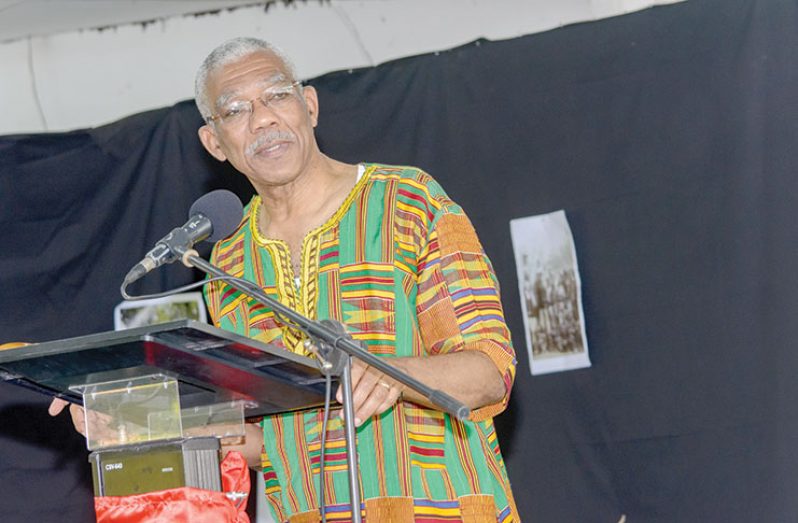THOUGH the Guyana Sugar Corporation (GuySuCo) is faced with a number of challenges, President David Granger has not given up on the ailing sugar industry.
This is despite remarks to the contrary from commentators and others about the industry being a ‘bad investment’. “The whole GuySuCo reform plan will be taken to the National Assembly; the plan is necessary because we have been spending billions of dollars every year to bail it out, but we still want to preserve the sugar industry and the employment of workers,” President Granger said Sunday at a Congress Place event to mark Ghana’s 60th Anniversary.
GuySuCo had announced last year that with a debt of $77.3B and consecutive losses, some officials were advising that the industry is one not worth investing in unless plans for the reorganisation, restructuring and diversification of the industry are present. Figures based on 2015 audited accounts show that GuySuCo recorded a profit just once in the past six years, this being in 2013 when there was an adjustment in taxes.
In light of the foregoing reasons, officials are recommending “radical reorganisation, contraction of sugar, and major diversification” as a matter of urgency “for better predictability and planning”.
This was the thrust of the President’s announcement on Sunday, when he indicated that there is serious need for the industry to be “rationalised”.
And, last Friday, the Ministry of the Presidency reported that during a ministerial conference at State House on February 28, there were discussions on major policy positions, particularly pertaining to GuySuCo.“…all we are looking to do is to work with the opposition, unions and members of civil society to make sure jobs and the sugar industry are preserved,” the President said Sunday, adding that an inclusive approach is being taken towards ensuring that the industry does not crumble.
The efforts by the government is needed, according to GuySuCo, because the Corporation had reported last year that the need is high for these interventions because the industry is faced with many challenges, one of those being the fact that the cost of production is US 36 cents per pound, while it is only sold at US 16 cents per pound.
And, coupled with the deficit incurred because of the imbalanced prices, the Corporation is still faced with the fact that “101 per cent” of their revenue goes towards employment.
In 2015, it was recorded that 16,937 employees were employed by GuySuCo.
Therefore, taking the numerous factors into consideration, the Corporation has declared that they would need $18B in 2017 and a further $21B in 2018 to run GuySuCo. And, in order to reduce this, it was highlighted that the government must use the opportunity to access funds needed to keep sugar operational.
The corporation had also looked towards diversifying Rose Hall, Providence, Wales and the East Demerara estates. Meanwhile, the First Crop for 2017 commenced during the week ending February 18, 2017 at Uitvlugt and Blairmont Estates.
The Corporation’s sugar production target for the First Crop 2017 is 74,172 tonnes, however, with Skeldon Estate not having a First Crop, due to the co-generation plant being unsafe to operate as was advised by Skeldon Energy Inc. (SEI), the Corporation will not be benefitting from the budgeted 8,871 tonnes that the estate was expected to contribute to the overall production target.




.jpg)









